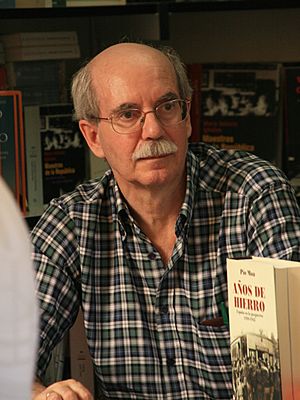Pío Moa facts for kids
Quick facts for kids
Pío Moa
|
|
|---|---|
 |
|
| Born | 1948 Vigo, Galicia, Spain |
| Occupation | Journalist |
| Subject | 20th century |
| Notable works | Myths of the Civil War |
Luis Pío Moa Rodríguez (born in Vigo, Galicia, in 1948), known as Pío Moa, is a Spanish writer and journalist. He writes historical books about important times in Spanish history. These include the start of the Spanish Civil War, the period of the Second Spanish Republic, and the time of Francoism. He also writes about different political groups from those years.
After Francisco Franco passed away and Spain became a democracy again, old documents about the Civil War started to become public. Pío Moa began to share ideas that suggested certain political groups, like the Popular Front, were responsible for the Spanish Civil War. He believes these groups caused a lot of problems for Spain. Moa also says that help given to the Spanish Republic by the Soviet Union during the war made it last longer. He compares this help to the support Nazi Germany and Fascist Italy gave to General Franco.
Pío Moa's writings often cause a lot of discussion in Spain. His book, Myths of the Civil War, was very popular. It sold 150,000 copies and was a best-seller for six months.
About Pío Moa
His Early Life and Views
Pío Moa was born in 1948 in Vigo, Galicia, Spain. When he was young, he was against the government of Franco. He was part of a group called the Communist Party of Spain. He was also involved with a secret group that had strong political views. Moa later wrote about this time in his book, About Time and a Country: His Early Political Views. After Spain became a democracy, Moa started studying Spanish history. Over time, his ideas changed, and he began to hold more traditional views.
His Work as a Writer
Pío Moa's opinions gradually became more conservative. He often criticizes the Spanish political left. He believes they were a main cause of the Spanish Civil War.
He has also written books about different topics. These include essays on Marxism and current Spanish politics. He also wrote a book about his own experiences in his early political groups. In his books, he often strongly criticizes the groups that were against Franco.
Some historians do not agree with Moa's work. They call him a "pseudo-historian." However, historian Stanley G. Payne has said good things about some of Moa's writings, even if he doesn't agree with everything.
Pío Moa has also expressed unusual ideas about the 11-M Madrid train bombings in 2004. He has been criticized by some groups for his views. He has stated in interviews that he does not defend the dictatorship, but rather criticizes its opponents.
He used to be the editor for historical magazines like Tanteos (from 1988 to 1990) and Ayeres (from 1991 to 1993). He also worked as a librarian at the Ateneo de Madrid. This is a well-known cultural place in Madrid. He was on its board of directors for three years.
Today, he writes for online newspapers, such as Libertad Digital.
See also
 In Spanish: Pío Moa para niños
In Spanish: Pío Moa para niños

